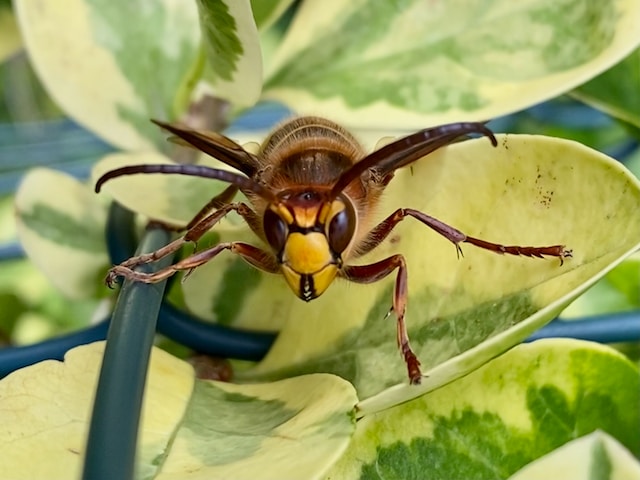Hornets are notorious for their intimidating size and aggressive behavior. These stinging insects can be a significant nuisance for homeowners, especially if they decide to build their nests near your home or property.
But what happens when a hornet decides to unleash its stinger? Do hornets die after they sting, or are they resilient enough to survive after an attack?
As pest control experts, we know that understanding the behavior of hornets is crucial for keeping your family and property safe. So, in this post, we’ll take a closer look at hornet stingers and whether or not these pests die after they sting.
If you’re looking for practical advice on how to deal with hornets, keep reading!
Why Do Wasps and Hornets Sting?
So you’re out for a lovely picnic on a sunny day, enjoying the fresh air and beautiful surroundings, when suddenly you hear a buzzing sound. You look around and see a wasp or hornet flying toward you. Uh-oh, it looks like trouble!

These insects have a weapon in their arsenal – their stingers. Like needles, their stings inject venom into your skin, causing discomfort, pain, swelling, redness, and itching around the sting site.
Why do they do it, you may ask? Well, wasps and hornets are fiercely protective of their nests, and when they feel threatened, they’ll stop at nothing to defend themselves and their colony. So, if you accidentally disturb their nest or come too close, they’ll use their stinger to fend you off.
Like any living creature, wasps have the instinct to protect themselves and their nests from perceived threats. If their safety is compromised, they’ll use their stingers to defend themselves, their nest, and their queen.
So, if you stumble upon a wasp nest or disturb a group of foraging hornets, don’t be surprised if they get defensive. They might buzz around you, getting closer and closer, warning you to stay away.
Do Hornets Die After They Sting?
Think about all the stinging critters you see outdoors during the summer. Whether you look at them in awe or fear, keeping your distance from these occasional pests is always best. Bees and wasps aren’t insects to trifle with; they’re unafraid to give you a warning sting or two.
But these stings often mean the end for our honey bee friends! When a honey bee stings a human or animal, it usually loses its stinger and dies shortly afterward.
A honey bee’s stinger is barbed, containing tiny hooks that help the stinger latch into the skin. When bees try to pull away, the barbs get stuck in the skin, causing the stinger to be removed from its body along with its venom sac and other internal organs.
Unfortunately for the bee, this process is fatal. Without its vital organs, the bee cannot survive for long and eventually dies. However, the venom in the bee’s sac continues to pump into the victim’s skin, causing pain, swelling, and other symptoms.
What happens when a hornet decides to use its stinger? Do hornets die after they sting?
Unlike bees, hornets have smooth stingers and can sting multiple times without injuring the hornet. So hornets won’t typically die following a sting unless it’s accidentally separated from its body.
Their stingers are long, thin structures at the end of their abdomens. Plus, these tiny appendages are sharp, too, capable of penetrating thick clothing and making them a formidable weapon against unsuspecting homeowners.
Protecting Yourself Against Wasps
So do hornets die after they sting? Unfortunately, these little pests can continually sting, fighting against anything they deem a threat. But fear not, my outdoor-loving friends! By following a few simple steps, you can reduce your risk of being stung by these highly defensive creatures.
First and foremost, try to avoid disturbing wasps and hornets or their nests. These insects will only sting if they feel threatened, so give them plenty of space and respect their personal bubble.
Another helpful tip is to cover your food and drinks when enjoying outdoor meals. Wasps and hornets have a sweet tooth and are attracted to sugary treats, so keeping your snacks protected can help deter them from joining the party.
And if you’re in an area full of these pests, be sure to wear protective clothing like long pants, long sleeves, and closed-toe shoes. This will help protect your skin from their stingers, and if you happen to spot one on your clothing, try to remain calm and still rather than swatting at it, which could provoke it to sting.
But what if you stumble upon a wasp or hornet nest? Whatever you do, do not attempt to remove it yourself! Instead, contact a pest control professional who can safely remove the nest without putting you or the insects at risk.
Last but not least, consider using insect repellent to keep wasps and hornets at bay. Look for products specifically designed to repel these insects and follow the instructions carefully.
By taking these simple steps, you can enjoy all the great outdoors has to offer without the fear of being stung by these stinging insects. And if you do happen to get stung and experience severe symptoms like difficulty breathing or swelling of the throat, seek medical attention immediately.
Trust proof. for Your Pest Control Needs!
Do you have a hornet problem making your home or yard unsafe? Don’t panic, but don’t wait to take action, either! While you might be tempted to tackle the issue, calling in a pest control professional is the best option for a quick and effective solution.
Dealing with a hornet nest can be incredibly dangerous. Our trained technicians can safely handle hornet infestations to minimize the risks of stings and other serious injuries. No more worrying if hornets die after they sting!
Don’t let a hornet infestation ruin your time outdoors or risk your family’s safety. Contact the experts at proof. Enjoy a hornet-free home and yard once again!

